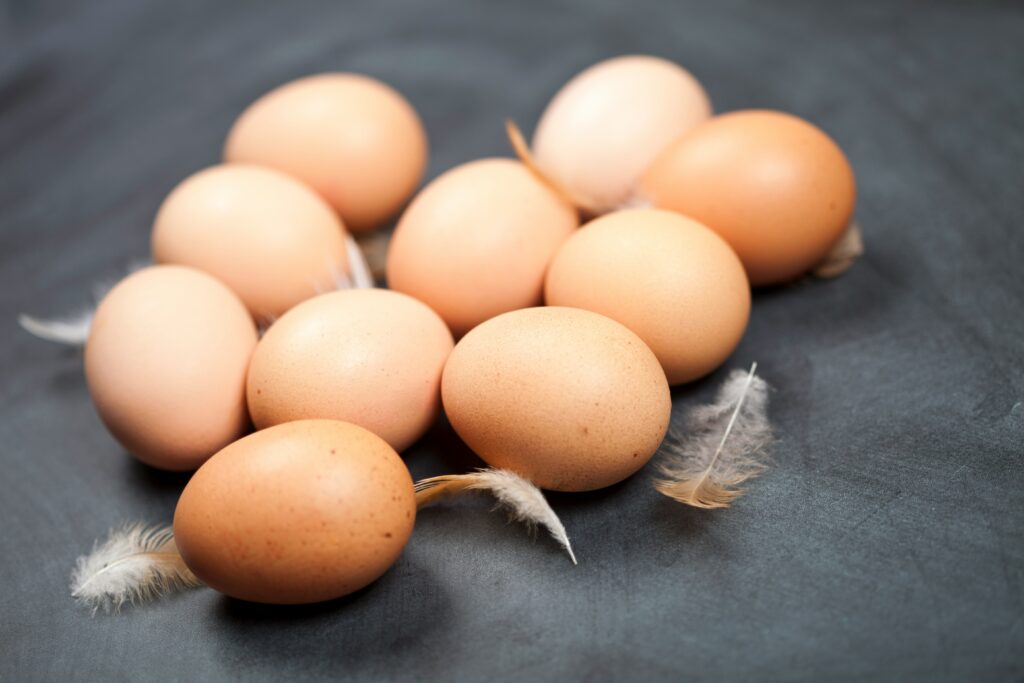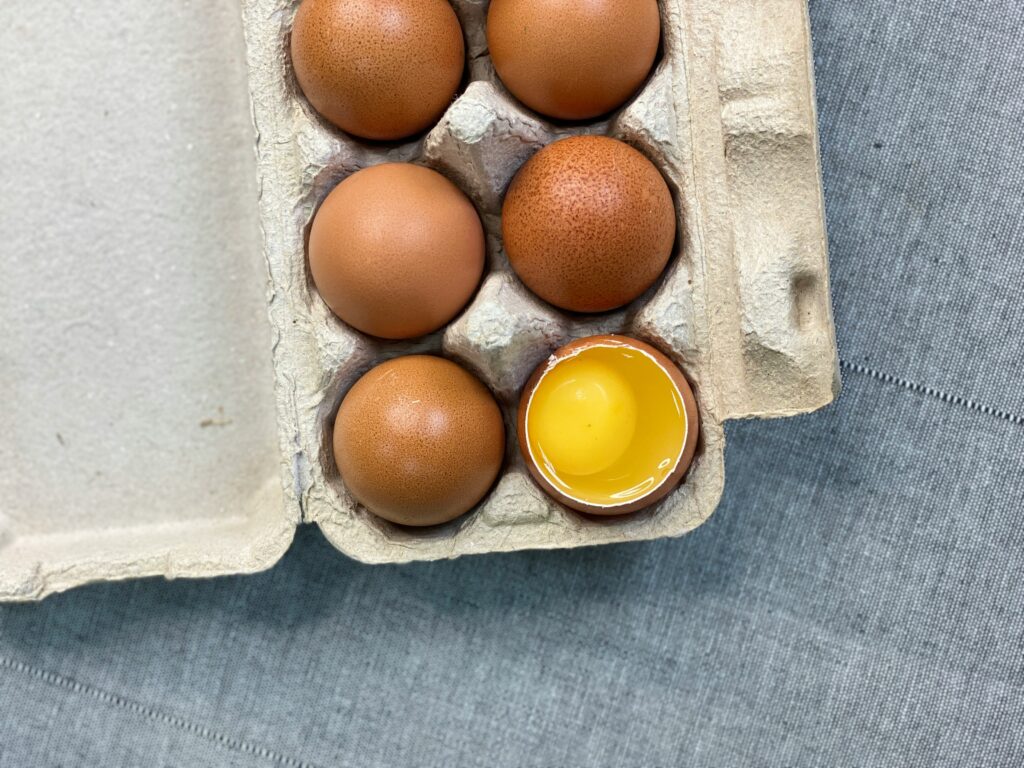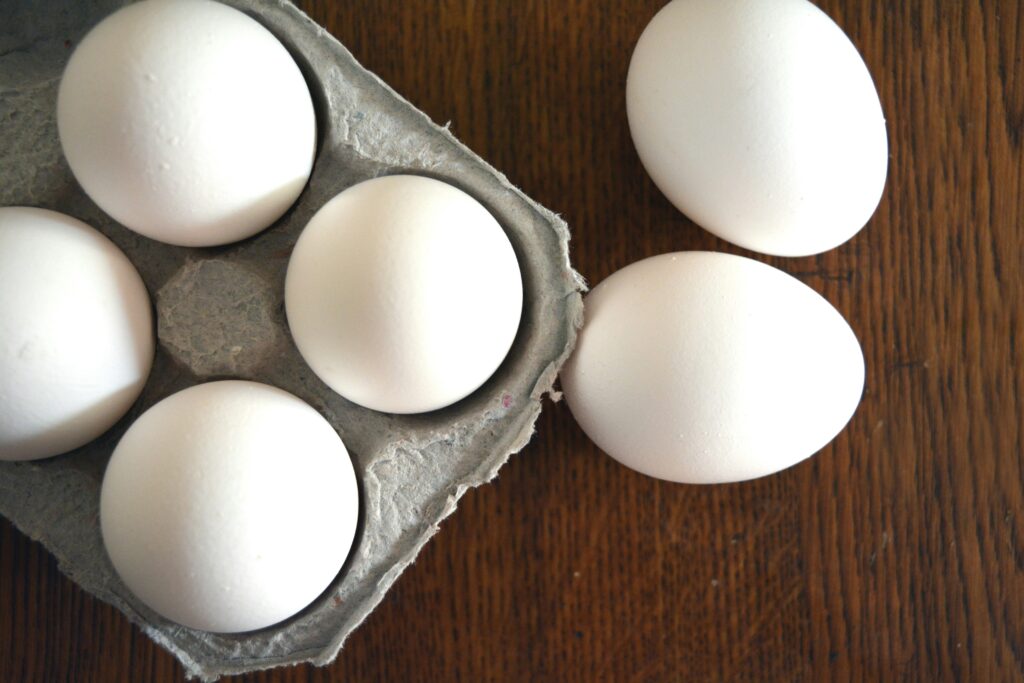Understanding the Protective Bloom: Nature’s Egg Sealant
Freshly laid eggs come with a natural coating called the bloom or cuticle. This invisible layer seals the pores of the eggshell, preventing bacteria from getting inside and moisture from escaping. When left unwashed, this bloom acts as a powerful line of defense, allowing the eggs to stay fresh for weeks at room temperature—particularly in temperate environments.

Photo by Maria Kovalets on Unsplash
Why Commercial Eggs Are Washed and Refrigerated
In the U.S., commercial eggs must be washed to meet USDA sanitation requirements. This cleaning process removes the bloom, which is why refrigeration becomes necessary immediately after processing. In contrast, many countries in Europe and Asia leave the bloom intact, storing and selling eggs at room temperature without issue.
This divergence in standards makes one thing clear: the shelf life of an egg heavily depends on whether the bloom is intact.
Shelf Life of Unwashed Farm Fresh Eggs at Room Temperature
Unwashed eggs can typically sit out for up to 2–3 weeks at room temperature (roughly 68°F or 20°C) without spoiling. However, several factors can shorten or extend this window, which we’ll explore next.
For optimal freshness, it’s best to consume within 14 days if stored in a warm climate or if you’re unsure of collection dates.
Factors That Impact How Long Eggs Can Sit Out
Temperature Fluctuations
If temperatures rise above 75°F (24°C), the risk of bacterial growth increases, shortening shelf life dramatically.
Humidity and Air Circulation
High humidity may encourage mold or spoilage on the shell, while a lack of airflow can trap heat and moisture. Ideally, store eggs in a cool, dry, and shaded area.
Egg Freshness at Time of Collection
Eggs laid within the last 24–48 hours will last longer outside the fridge than those that have already been sitting in the nesting box for several days.
USDA Guidelines vs. Real-World Practices
While USDA guidelines require immediate refrigeration post-washing, they do not directly address the storage of unwashed backyard eggs. Many homesteaders and small farm owners safely store eggs on the counter, relying on time-tested methods and a bit of common sense. The discrepancy highlights the divide between regulatory compliance and traditional, nature-aligned egg handling.
How Long Is Too Long? General Timeframes Explained
| Storage Condition | Unwashed Egg Lifespan |
| Room temperature (cool, dry) | 2–3 weeks |
| Refrigerated (after sitting out) | Varies – not ideal due to condensation risks |
| Root cellar (~50–60°F) | Up to 3 months |
| Refrigerated from day 1 | Up to 4–5 months |

Room Temperature Storage: Best Practices
Ideal Storage Conditions
- Temperature: 55–68°F (13–20°C)
- Humidity: Below 60%
- Avoid: Direct sunlight, near stoves or warm appliances
Storing in Cartons vs. Open Bowls
Keeping eggs in cartons reduces air exposure and protects the shell. Plus, it makes it easy to track collection dates with a pencil note on each egg.
How to Perform the Water Test for Egg Freshness
Place an egg in a bowl of water:
- Sinks and lays flat = Very fresh
- Sinks but stands upright = 1–2 weeks old
- Floats = Spoiled – discard it
This method works due to the air cell inside the egg growing as moisture evaporates over time.
Identifying Spoiled Eggs: Sight, Smell, and Texture
- Smell: Sulfur or rotten odor? Toss it.
- Shell: Cracks, mold, or sticky residue? Discard.
- Inside: Blood spots are natural; green or black yolk? Unsafe.
If you’re ever in doubt, don’t eat it.
Should You Wash Fresh Eggs Before Storage?
If you’re storing eggs at room temperature, do not wash them. Keep the bloom intact. Only clean right before use, using a dry cloth or gentle brush. If eggs are visibly soiled and need to be refrigerated, rinse them with warm (not cold) water and dry them quickly.
Can You Refrigerate Unwashed Eggs After Sitting Out?
It’s risky. Condensation can form on the eggshell once cold air hits a warm egg, potentially drawing bacteria inside. If refrigeration is necessary, chill them gradually in a cool basement or cellar before transferring to the fridge.

Photo by engin akyurt on Unsplash
Global Egg Storage Practices Compared
| Region | Washing Policy | Refrigeration |
| USA | Mandatory | Yes |
| UK | Not required | No (sold on shelves) |
| Australia | Not required | Optional |
| Japan | Frequently washed | Yes |
| Philippines | Rarely washed | No (common shelf storage) |
This illustrates that safety isn’t just about refrigeration—it’s about preservation of the natural barrier.
Health Risks of Eating Spoiled Eggs
Eating a spoiled egg can result in salmonella, food poisoning, nausea, or abdominal cramps. Symptoms may appear within 6–48 hours. Vulnerable populations—like kids, elderly, or immunocompromised individuals—should avoid borderline eggs entirely.
How to Extend the Shelf Life of Fresh Eggs
Use of Mineral Oil or Wax Coating
Lightly coating unwashed eggs with food-grade mineral oil helps lock in moisture and reinforces the bloom.
Root Cellar or Cool Pantry Methods
Natural cooling spaces like cellars can prolong freshness for up to 3 months.
FAQs
How long do fresh unwashed eggs last in summer?
About 7–10 days unless stored in a cool, shaded location.
Can I freeze unwashed eggs?
Not in-shell. Crack, whisk, and freeze in ice cube trays.
Should I refrigerate if unsure whether eggs are washed?
Yes, better safe than sorry.
Is it okay to eat eggs with poop on them?
Clean only when needed—but cook thoroughly.
Can I return washed eggs to room temp?
No. Once chilled, always chilled.
What happens if I eat a bad egg?
Expect nausea, vomiting, and stomach upset—seek medical help if severe.

Photo by Kotagauni Srinivas on Unsplash
Conclusion: Trusting Your Senses and Storing Eggs Right
In the world of fresh, unwashed eggs, nature knows best. As long as the bloom is intact and conditions are favorable, these eggs can sit out safely for weeks. By following basic guidelines—keeping them cool, dry, and unwashed—you can enjoy farm-fresh eggs with confidence. Trust your nose, use the water test, and don’t be afraid to lean into old-school wisdom that works.
